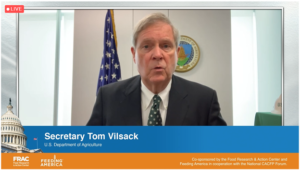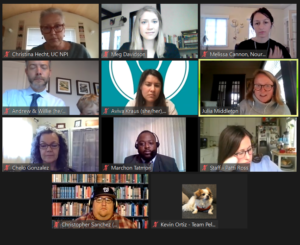Federal Advocacy in the Time of COVID
Every spring, our Policy & Advocacy team flies to Washington D.C. for a National Anti-Hunger Policy Conference co-hosted by Feeding America and the Food Research and Action Center. Our new COVID reality has shifted the conference from our nation’s capital to our own home offices but hasn’t diminished the power of uniting thousands of anti-poverty and anti-hunger advocates in common purpose.
New Administration, New Opportunities
Since assuming office in January, the Biden Administration has taken dramatic, long-sought steps to reduce hunger across the country during the COVID crisis. The passage of the American Rescue Plan represents a one-in-a-generation investment in low-income Americans and in our nation’s children. From extending increased benefit levels for SNAP (food stamps) recipients to providing support for free meals for kids while in-person learning is suspended to making it easier for college students to access SNAP, the Biden Administration has made rapid investments in our anti-hunger infrastructure nationwide.

Advocates at the Anti-Hunger Policy Conference will hear from the new Secretary of Agriculture at the USDA, Tom Vilsack. Food banks like ours receive millions of pounds of food through the USDA and the SNAP/CalFresh program is also funded through the agency, so we look forward to continuing to build relationships with the new Secretary and his staff to push for increased funding and policy advancements for our federal nutrition programs.
Lobbying From Your Living Room
 The new remote format makes it easier for advocates who were previously unable to participate in the vital activity of meeting directly with our elected leaders because of the challenge of paying for travel to D.C. Our Policy & Advocacy team arranged meetings with our Members of Congress and fellow community-based organizations from our district to share the local impact of Federal policies and request their support for policies and funding to alleviate hunger across their district.
The new remote format makes it easier for advocates who were previously unable to participate in the vital activity of meeting directly with our elected leaders because of the challenge of paying for travel to D.C. Our Policy & Advocacy team arranged meetings with our Members of Congress and fellow community-based organizations from our district to share the local impact of Federal policies and request their support for policies and funding to alleviate hunger across their district.
Our priorities include continuing to strengthen the social safety net through extending SNAP and school meal flexibilities, fortifying the donated food pipeline that keeps food bank shelves stocked, and making long-term investments in child nutrition. We will continue to fight for these vital resources to keep our communities nourished, during COVID and long after.



Share